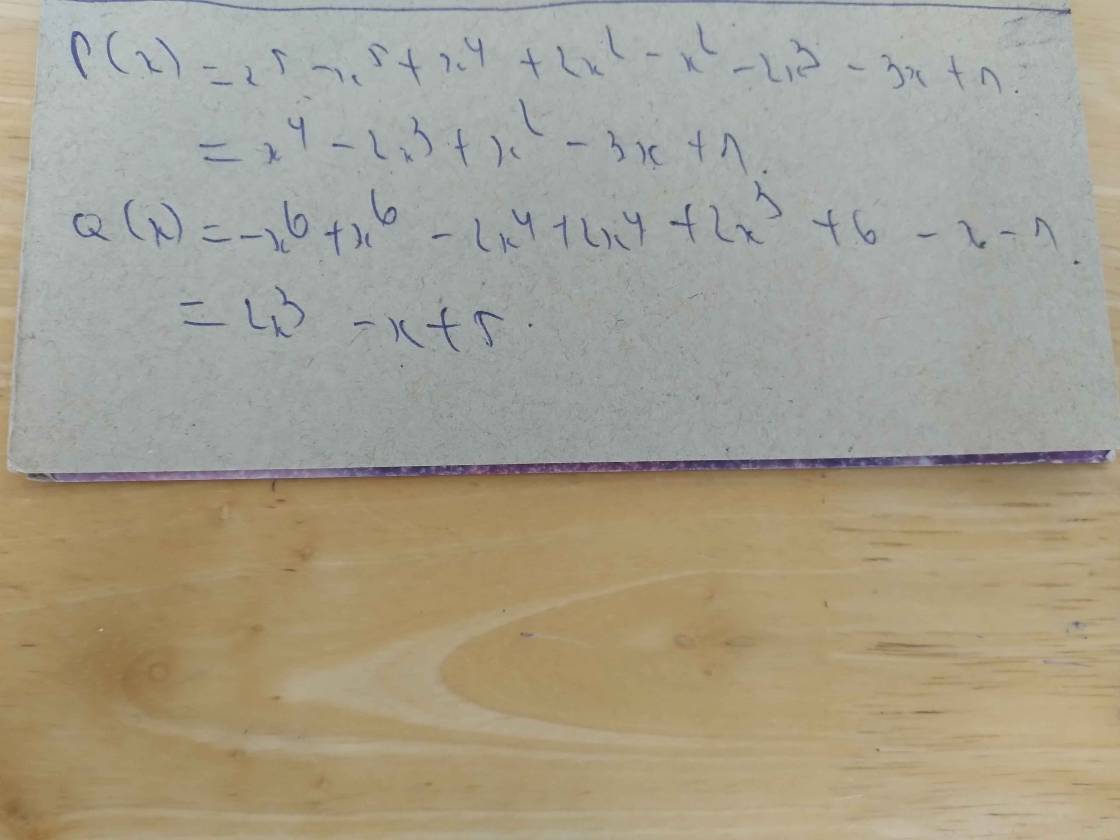Hãy nhập câu hỏi của bạn vào đây, nếu là tài khoản VIP, bạn sẽ được ưu tiên trả lời.

`P(x)=x ^ 5 + 2x ^ 2 - x ^ 2 - 2x ^ 3 - x ^ 5 + x ^ 4 - 3x + 1`
`P(x)= (x^5-x^5)+x^4-2x^3+(2x^2-x^2)-3x+1`
`P(x)=x^4+2x^3+x^2-3x+1`
`Q(x)=`\(-x^6+2x^3+6-2x^4+x^6-x-1+2x^4\)
`Q(x)= (-x^6+x^6)+(-2x^4+2x^4)+2x^3-x+(6-1)`
`Q(x)=2x^3-x+5`

\(\begin{array}{l}a)A = 3x - 4{x^4} + {x^3}\\ = - 4{x^4} + {x^3} + 3x\\b)B = - 2{x^3} - 5{x^2} + 2{x^3} + 4x + {x^2} - 5\\ = ( - 2{x^3} + 2{x^3}) + \left( { - 5{x^2} + {x^2}} \right) + 4x - 5\\ = 0 + ( - 4{x^2}) + 4x - 5\\ = - 4{x^2} + 4x - 5\\c)C = {x^5} - \dfrac{1}{2}{x^3} + \dfrac{3}{4}x - {x^5} + 6{x^2} - 2\\ = \left( {{x^5} - {x^5}} \right) - \dfrac{1}{2}{x^3} + 6{x^2} + \dfrac{3}{4}x - 2\\ = - \dfrac{1}{2}{x^3} + 6{x^2} + \dfrac{3}{4}x - 2\end{array}\)

b) Ta có: \(5^{x+4}-3\cdot5^{x+3}=2\cdot5^{11}\)
\(\Leftrightarrow2\cdot5^{x+3}=2\cdot5^{11}\)
\(\Leftrightarrow x+3=11\)
hay x=8
c) Ta có: \(2\cdot3^{x+2}+4\cdot3^{x+1}=10\cdot3^6\)
\(\Leftrightarrow18\cdot3^x+12\cdot3^x=10\cdot3^6\)
\(\Leftrightarrow30\cdot3^x=30\cdot3^5\)
Suy ra: x=5
d) Ta có: \(6\cdot8^{x-1}+8^{x+1}=6\cdot8^{19}+8^{21}\)
\(\Leftrightarrow6\cdot\dfrac{8^x}{8}+8^x\cdot8=6\cdot8^{19}+64\cdot8^{19}\)
\(\Leftrightarrow8^x\cdot\dfrac{35}{4}=70\cdot8^{19}\)
\(\Leftrightarrow8^x=8^{20}\)
Suy ra: x=20

1: x=3/4-1/2=3/4-2/4=1/4
2: x-1/5=2/11
=>x=2/11+1/5=21/55
3: x-5/6=16/42-8/56
=>x-5/6=8/21-4/28=5/21
=>x=5/21+5/6=15/14
4: x/5=5/6-19/30
=>x/5=25/30-19/30=6/30=1/5
=>x=1
5: =>|x|=1/3+1/4=7/12
=>x=7/12 hoặc x=-7/12
6: x=-1/2+3/4
=>x=3/4-1/2=1/4
11: x-(-6/12)=9/48
=>x+1/2=3/16
=>x=3/16-1/2=-5/16
1)x= 1/4
2)x= 2/11+ 1/5
x= 21/55
3)x - 5/6 = 5/21
x = 5/21+5/6
x = 15/14
4)x/5 = 5/6 + -19/30
x:5 = 1/5
x = 1/5.5
x = 1
5) |x| - 1/4 = 6/18
|x| = 6/18 - 1/4
|x| =7/12
⇒x= 7/12 hoặc -7/12
6)x = -1/2 +3/4
x= 1/4
7) x/15 = 3/5 + -2/3
x:15 = -1/15
x = -1/15. 15
x = -1
8)11/8 + 13/6 = 85/x
85/24 = 85/x
⇒ x = 24
9) x - 7/8 = 13/12
x = 13/12 + 7/8
x = 47/24
10)x - -6/15 = 4/27
x = 4/27 + (-6/15)
x = -34/135
11) -(-6/12)+x = 9/48
x= 9/48 - 6/12
x = -5/16
12) x - 4/6 = 5/25 + -7/15
x -4/6 = -4/15
x = -4/15 + 4/6
x = 2/5

a: \(P\left(x\right)=x^5+2x^4-9x^3-x\)
\(Q\left(x\right)=5x^4+9x^3+4x^2-14\)
b: Hệ số cao nhất của P(x) là 1
Hệ số tự do của P(x) là 0
`a)`
`@P(x)=x^5-2x^2+7x^4-9x^3-x+2x^2-5x^4`
`P(x)=x^5+(7x^4-5x^4)-9x^3-(2x^2-2x^2)-x`
`P(x)=x^5+2x^4-9x^3-x`
`@Q(x)=5x^4-x^5+4x^2-6+9x^3-8+x^5`
`Q(x)=(-x^5+x^5)+5x^4+9x^3+4x^2-(6+8)`
`Q(x)=5x^4+9x^3+4x^2-14`
~~~~~~~~~~~~~~~~~~~~~~~~~~~~~~~~~~~~~~~~~~~~~~~~~~~~~
`b)` Đa thức `P(x)` có:
`@` Hệ số cao nhất: `1`
`@` Hệ số tự do: `0`

a,
\(5^{x+4}-3.5^{x+3}=2.5^{11}\)
\(\Rightarrow5^{x+3}\left(5-3\right)=2.5^{11}\)
\(\Rightarrow5^{x+3}2=2.5^{11}\)
\(\Rightarrow5^{x+3}=5^{11}\)
\(\Rightarrow x+3=11\)
\(\Rightarrow x=8\)
b, (Check lai xem de sai o dau khong nhe)
\(3.5^{x+2}+4.5^{x+3}=19.5^{10}\)
Dat 5x ra ben ngoai
\(\Rightarrow5^x.5^23+5^x:5^{-3}.4\)
\(\Rightarrow5^x\left(5^2.3+5^{-3}.4\right)\)
\(\Rightarrow5^x\left(5^{-3}.5^5.3+5^{-3}.4\right)\)
\(\Rightarrow5^x[5^{-3}\left(5^53+4\right)\)
\(\Rightarrow5^x[5^{-3}\left(3125.3+4\right)\)
\(\Rightarrow5^x\left(5^{-3}\right).9379\)
=> Khong tim duoc gia tri cua x \(\Rightarrow x\in\varnothing\)

\(a,3-x=x+1,8\)
\(\Rightarrow-x-x=1,8-3\)
\(\Rightarrow-2x=-1,2\)
\(\Rightarrow x=0,6\)
\(b,2x-5=7x+35\)
\(\Rightarrow2x-7x=35+5\)
\(\Rightarrow-5x=40\)
\(\Rightarrow x=-8\)
\(c,2\left(x+10\right)=3\left(x-6\right)\)
\(\Rightarrow2x+20=3x-18\)
\(\Rightarrow2x-3x=-18-20\)
\(\Rightarrow-x=-38\)
\(\Rightarrow x=38\)
\(d,8\left(x-\dfrac{3}{8}\right)+1=6\left(\dfrac{1}{6}+x\right)+x\)
\(\Rightarrow8x-3+1=1+6x+x\)
\(\Rightarrow8x-3=7x\)
\(\Rightarrow8x-7x=3\)
\(\Rightarrow x=3\)
\(e,\dfrac{2}{9}-3x=\dfrac{4}{3}-x\)
\(\Rightarrow-3x+x=\dfrac{4}{3}-\dfrac{2}{9}\)
\(\Rightarrow-2x=\dfrac{10}{9}\)
\(\Rightarrow x=-\dfrac{5}{9}\)
\(g,\dfrac{1}{2}x+\dfrac{5}{6}=\dfrac{3}{4}x-\dfrac{1}{2}\)
\(\Rightarrow\dfrac{1}{2}x-\dfrac{3}{4}x=-\dfrac{1}{2}-\dfrac{5}{6}\)
\(\Rightarrow-\dfrac{1}{4}x=-\dfrac{4}{3}\)
\(\Rightarrow x=\dfrac{16}{3}\)
\(h,x-4=\dfrac{5}{6}\left(6-\dfrac{6}{5}x\right)\)
\(\Rightarrow x-4=5-x\)
\(\Rightarrow x+x=5+4\)
\(\Rightarrow2x=9\)
\(\Rightarrow x=\dfrac{9}{2}\)
\(k,7x^2-11=6x^2-2\)
\(\Rightarrow7x^2-6x^2=-2+11\)
\(\Rightarrow x^2=9\Rightarrow\left[{}\begin{matrix}x=3\\x=-3\end{matrix}\right.\)
\(m,5\left(x+3\cdot2^3\right)=10^2\)
\(\Rightarrow5\left(x+24\right)=100\)
\(\Rightarrow x+24=20\)
\(\Rightarrow x=-4\)
\(n,\dfrac{4}{9}-\left(\dfrac{1}{6^2}\right)=\dfrac{2}{3}\left(x-\dfrac{2}{3}\right)^2+\dfrac{5}{12}\)
\(\Rightarrow\dfrac{2}{3}\left(x-\dfrac{2}{3}\right)^2+\dfrac{5}{12}=\dfrac{4}{9}-\dfrac{1}{36}\)
\(\Rightarrow\dfrac{2}{3}\left(x-\dfrac{2}{3}\right)^2+\dfrac{5}{12}=\dfrac{5}{12}\)
\(\Rightarrow\dfrac{2}{3}\left(x-\dfrac{2}{3}\right)^2=0\)
\(\Rightarrow x-\dfrac{2}{3}=0\Rightarrow x=\dfrac{2}{3}\)
#\(Urushi\text{☕}\)

a)\(P\left(x\right)=x^5+2x^4-9x^3-x\)
\(Q\left(x\right)=5x^4+9x^3+4x^2-14\)
b) Sửa Tìm hệ số cao nhất và hệ số tự do của đa thức Q(x)
hệ số cao nhất :9
hệ số tự do :- 14
c)\(M\left(x\right)=P\left(x\right)+Q\left(x\right)\)
\(\Leftrightarrow M\left(x\right)=x^5+2x^4-9x^3-x+5x^4+9x^3+4x^2-14\)
\(M\left(x\right)=x^5+6x^4-x-14\)
d)\(M\left(2\right)=2^5+6.2^4-2-14=32-96-2-14=-80\)
\(M\left(-2\right)=\left(-2\right)^5+6.\left(-2\right)^4+2-14=-32-96+2-14=-140\)
\(M\left(\dfrac{1}{2}\right)=\left(\dfrac{1}{2}\right)^5+6.\left(\dfrac{1}{2}\right)^4-\dfrac{1}{2}-14=\dfrac{1}{32}+\dfrac{3}{8}-\dfrac{1}{2}-14=-\dfrac{475}{32}\)

Bài 1:
a; \(\dfrac{7}{8}\) + \(x\) = \(\dfrac{4}{7}\)
\(x\) = \(\dfrac{4}{7}\) - \(\dfrac{7}{8}\)
\(x\) = \(\dfrac{32}{56}\) - \(\dfrac{49}{56}\)
\(x=-\) \(\dfrac{49}{56}\)
Vậy \(x=-\dfrac{49}{56}\)
b; 6 - \(x\) = - \(\dfrac{3}{4}\)
\(x\) = 6 + \(\dfrac{3}{4}\)
\(x\) = \(\dfrac{24}{4}+\dfrac{3}{4}\)
\(x=\dfrac{27}{4}\)
Vậy \(x=\dfrac{27}{4}\)
c; \(\dfrac{1}{-5}\) + \(x\) = \(\dfrac{3}{4}\)
\(x\) = \(\dfrac{3}{4}\) + \(\dfrac{1}{5}\)
\(x=\dfrac{15}{20}\) + \(\dfrac{4}{20}\)
\(x=\dfrac{19}{20}\)
Vậy \(x=\dfrac{19}{20}\)
Bài 1:
d; - 6 - \(x\) = - \(\dfrac{3}{5}\)
\(x\) = - 6 + \(\dfrac{3}{5}\)
\(x=-\dfrac{30}{5}\) + \(\dfrac{3}{5}\)
\(x=-\dfrac{27}{5}\)
Vậy \(x=-\dfrac{27}{5}\)
e; - \(\dfrac{2}{6}\) + \(x\) = \(\dfrac{5}{7}\)
\(x\) = \(\dfrac{5}{7}\) + \(\dfrac{2}{6}\)
\(x\) = \(\dfrac{15}{21}\) + \(\dfrac{1}{3}\)
\(x=\dfrac{15}{21}\) + \(\dfrac{7}{21}\)
\(x=\dfrac{22}{21}\)
Vậy \(x=\dfrac{22}{21}\)
f; - 8 - \(x\) = - \(\dfrac{5}{3}\)
\(x\) = \(-\dfrac{5}{3}\) + 8
\(x\) = \(\dfrac{-5}{3}\) + \(\dfrac{24}{3}\)
\(x\) = \(\dfrac{-19}{3}\)
Vậy \(x=-\dfrac{19}{3}\)

a) \(A\left(x\right)=x^7-2x^6+2x^3-2x^4-x^7+x^5+2x^6-x+5+2x^4-x^5\)
\(A\left(x\right)=(x^7-x^7)+(-2x^6+2x^6)+2x^3+(-2x^4+2x^4)+(x^5-x^5)-x+5\)
\(A\left(x\right)=2x^3-x+5\)
- Bậc của đa thức A(x) là 3
- Hệ số tự do: 5
- Hệ số cao nhất: 2
b) \(B\left(x\right)=-3x^5+4x^4-2x+\dfrac{1}{2}-2x^4+3x-x^5-2x^4+\dfrac{5}{2}+x\)
\(B\left(x\right)=(-3x^5-x^5)+(4x^4-2x^4-2x^4)+(-2x+x+3x)+\left(\dfrac{1}{2}+\dfrac{5}{2}\right)\)
\(B\left(x\right)=-4x^5+2x+3\)
- Bậc của đa thức B(x) là 5
- Hệ số tự do: 3
- Hệ số cao nhất: \(-4\)
c) \(C\left(y\right)=5y^2-2.\left(y+1\right)+3y.\left(y^2-2\right)+5\)
\(C\left(y\right)=5y^2-2y-2+3y\left(y^2-2\right)+5\)
\(C\left(y\right)=5y^2-2y-2+3y^3-6y+5\)
\(C\left(y\right)=5y^2-2y+3+3y^3-6y\)
\(C\left(y\right)=5y^2-8y+3+3y^3\)
\(C\left(y\right)=3y^3+5y^2-8y+3\)
- Bậc của đa thức C(y) là 3
- Hệ số tự do: 3
- Hệ số cao nhất: 3

Chọn đáp án A